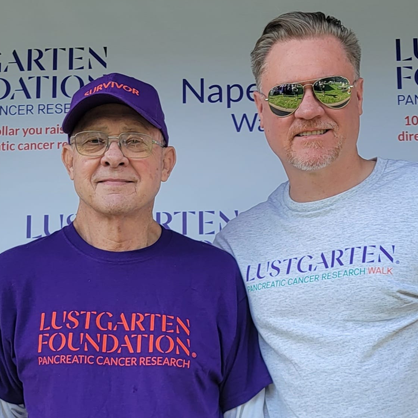“I Feel Like the Luckiest Guy Alive”

Lindell Williams, 78, and his wife Linda, high school sweethearts originally from St. Louis, have been married for 58 years. They continue to write more chapters of their love story—a story they feared would be devastatingly cut short by Lindell’s pancreatic cancer diagnosis in March 2012.
In retrospect, Lindell recalls having mild symptoms, including trouble sleeping and stomach discomfort, six months before his diagnosis, but never imagined he had cancer. Then, in early 2012, his young granddaughter asked him why his eyes were yellow; she was the first one to notice his jaundice. Terrified, he immediately saw his primary care physician, who said he was jaundiced due to a blocked bile duct. The doctor ordered a CT scan, followed by an endoscopy during which a biopsy was taken, and the couple had to agonizingly wait until the next day for the biopsy results that would confirm the shocking diagnosis: stage 3-4 pancreatic cancer.
Up to that point, Lindell was in excellent health and had no family history of pancreatic cancer. An optimist by nature, he was determined to do whatever he could to combat this disease. He met with his surgeon, who told him he was luckily in the small percentage of patients eligible for surgery, which would provide the best chance for long-term survival. However, his tumor was against an artery, and he could lose a significant amount of blood during the surgery, which could be very dangerous.
Due to these potential complications, Lindell’s surgeon and oncologist chose a different initial treatment path for him: neoadjuvant therapy. They prescribed FOLFIRINOX, which at the time was a relatively new cocktail of four chemotherapies. The chemotherapy was followed by 30 radiation treatments to further shrink the tumor away from the artery so the surgeon wouldn’t need to resect the artery. Seven months after his initial diagnosis, Lindell underwent a complicated Whipple surgery, which involved removal of part of the stomach, the duodenum (the first part of the small intestine that connects to the stomach), the head of the pancreas, part of the bile duct, the gallbladder, and lymph nodes in the area of the pancreas. Shortly after leaving the hospital, he developed an abscess related to the surgery. Three months after healing from the trauma of the surgery and the subsequent infection, he learned there was no evidence of disease in his body, and no further treatment was needed.
“My surgeon told me, ‘Mr. Williams, I’m not a betting man, but I would bet on you,’” said Lindell. And the surgeon continued to bet on him for the next three years, when he had a 50/50 chance of experiencing an incurable recurrence. Lindell got his affairs in order, always hoping for the best but fearing the worst.
Now, more than a decade later, Lindell still reflects on this difficult journey, but he spends more time living his life, which includes participating in an antique car club near his home in Chicago, walking two miles every day, and spending time with his wife and family (including five grandchildren). Going through this diagnosis has made Lindell reconsider what is truly important in life, maintain his perspective, and let the little things go. “I feel like the luckiest guy alive. I never thought I didn’t have a chance to beat this disease, but as more time goes on, I am more hopeful.”
Lindell credits his dedicated medical team for enabling him to be a 10-year pancreatic cancer survivor. He advises other patients to find the best medical teams for them and listen to their doctors’ advice, not conflicting information from other sources like the Internet and people who mean well but who are not pancreatic cancer experts.
Lindell continues to receive annual CT scans and semi-annual blood work. His latest blood work, in June 2023, showed a slight uptick in cancer markers in his blood, but nothing his doctors are concerned about. And, while he experiences long-term gastrointestinal side effects and insulin-dependent diabetes as a result of treatment and surgery, and continues to take pancreatic enzymes, he feels blessed and grateful to be living a relatively normal life.
For the past several years, Lindell has participated as part of Team Fred/Naper A’s/Lindy/Pam/Roger/Paul’s Bro&Sis/Illinois Region Tim Kelly&Jim Patterson at the Lustgarten Foundation Naperville Walk for Pancreatic Cancer Research. The team is led by Ray McMahon, a fellow member of Lindell’s antique car club who started the team in memory of two members and a third member’s wife, all of whom died from pancreatic cancer. Lindell enjoys this uplifting event and being around others who, like him, are hoping for a cure and until then, more treatment options and early detection techniques to give patients and their families more time together. For the past two years, he has participated in the ribbon-cutting ceremony, and he never loses sight of how fortunate he is to be a survivor. Lindell stands as an example to other patients and their families that they should never give up hope their stories, like his, have many more chapters to be written.
